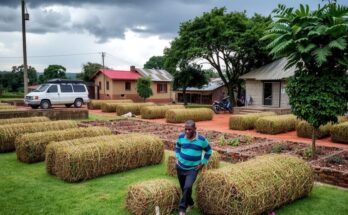In response to the challenges posed by climate change, Indian agricultural scientists are developing resilient rice seed varieties to endure unpredictable weather and ensure food security. Farmers are beginning to adopt these tougher seeds, which promise better yields and disease resistance. Government initiatives aim to increase the adoption of these seeds, while experts emphasize the need for accessible education and support for farmers to enhance agricultural sustainability.
In India, the agricultural landscape is under considerable strain due to a warming climate that is disrupting traditional farming practices. One of the notable regions affected is Rayanpet, a village in the southern part of the country, where fluctuating weather patterns pose challenges for rice cultivation. Farmers like P. Ravinder Reddy have observed that the predictability of rainfall has diminished over the years, leading to difficulties in sowing seeds effectively. Reddy expressed, “We used to know when it would rain and for how long, and we sowed our seeds accordingly. Now it’s so unpredictable and many times the seeds don’t sprout either because there’s too much rain or it’s completely dry.” Fortunately, research organizations throughout India are advancing efforts to develop resilient rice varieties that can adapt to these changing climatic conditions. Reddy has been utilizing these improved seeds, reporting enhanced yields requiring less water while also being more resistant to diseases. He stated, “I have planted them across a quarter of my 25-acre field because there’s still demand for older varieties, but I think in a few years, we will use only these tougher seeds.” As a major player in global wheat and rice production, India’s need for innovative agricultural solutions has become increasingly urgent given the alarming statistics published by the United Nations that revealed over 700 million people experienced hunger last year. The country’s vulnerability to climate change necessitates the development of robust seed varieties that ensure food security for its population and sustain its export capabilities. The impacts of climate change are stark, with erratic rainfall patterns, rising temperatures, and pest infestations threatening the livelihoods of nearly 120 million farmers, many of whom own less than five acres of land. While some farmers are adopting natural farming methods to counteract these impacts, these techniques often lead to reduced yields. The Indian government has recognized the necessity of promoting the adoption of climate-resilient seeds without sacrificing productivity. Challenges such as increased groundwater salinity, intense rainfall events, prolonged dry spells, and higher night temperatures can adversely affect rice cultivation. Prominent agricultural experts, including Ashok Kumar Singh from the Indian Agriculture Research Institute, emphasize the critical need for seeds engineered to withstand these climate challenges. Singh has facilitated the creation of numerous climate-resilient rice varieties, with over 2,000 new seed types released within the past decade. This momentum was further bolstered earlier this year when Prime Minister Narendra Modi launched 109 new climate-resilient seed varieties across various crops. The government aims to ensure that 25% of the land cultivated for paddy will be planted with these resilient seeds during the upcoming kharif (winter) season. As agricultural scientists, such as Janila Pasupuleti from the International Crops Research Institute for the Semi-Arid Tropics, emphasize, breeding for multiple climate stressors not only stabilizes yields but also enhances nutritional quality for both farmers and consumers. However, the success of these advancements hinges on ensuring that such seeds are accessible and affordable for farmers, along with adequate training on their use. Aditi Mukherji of the Consultative Group on International Agricultural Research remarked on the lessons learned from India’s green revolution of the 1960s, highlighting the importance of well-coordinated support services for reaching farmers effectively. The call for increased funding for agricultural research and development resonates strongly among experts, with suggestions to allocate at least 1% of the agricultural Gross Domestic Product towards this endeavor, as Reddy continues to prepare his fields for the upcoming planting season, expressing hope that more farmers will adopt climate-resilient seeds while asking for favorable market conditions for their harvests.
The topic of climate resilience in agriculture is crucial, particularly in the context of India, which is heavily dependent on its agricultural sector for food production and export. The increasing unpredictability of climatic factors such as rainfall and temperature poses a significant threat to traditional farming methods, especially in regions that have historically relied on specific patterns for planting and harvesting. As climate change progresses, the need for developing resilient crop varieties becomes essential to ensure food security, mitigate the impacts of extreme weather, and support the livelihoods of millions of farmers who are grappling with these challenges. Enhanced seed varieties have the potential to increase yields, reduce water usage, and provide resistance to diseases, making them pivotal in adapting to a changing environment. Research institutions play a critical role in this transformation, driving the innovation needed for sustainable agricultural practices.
In summary, the climate crisis poses considerable challenges to India’s agricultural sector, necessitating the development and adoption of climate-resilient seeds. Farmers like P. Ravinder Reddy are beginning to experience the positive effects of these advanced agricultural technologies, which promise greater yields and better adaptability to changing weather patterns. However, to maximize the impact of these innovations, it is vital to ensure that farmers have access to education and resources regarding these seeds. As the government and scientific communities continue to promote resilient crop varieties, addressing the financial and logistical barriers that farmers face will be critical in fostering a more sustainable agricultural future for India.
Original Source: abcnews.go.com




